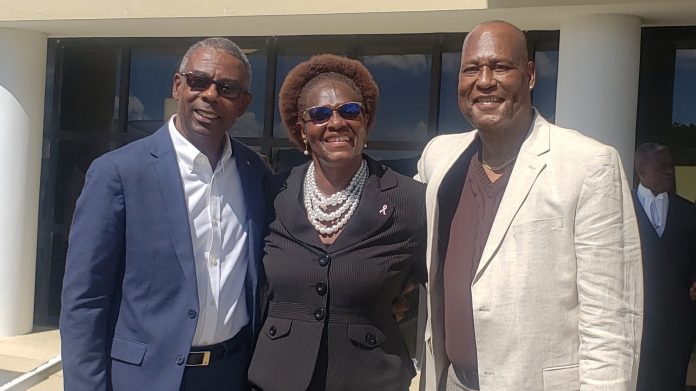By Latrishka Thomas
An application has been made to have the higher court review the decision made by Justice Colin Williams to dismiss the case against the three former cabinet ministers who were accused of corruption, embezzlement and conversion of three buses in 2008.
The prosecution yesterday filed the appeal to the Eastern Caribbean Court of Appeal on 12 grounds indicating how it believes the trial judge erred in law.
On November 23, the High Court judge returned a formal verdict of ‘not guilty’ in the corruption scandal involving the former United Progressive Party (UPP) ministers Harold Lovell, Wilmoth Daniel and Dr Jacqui Quinn.
After an almost three-week judge-only trial, the lawyers who represented the defendants made ‘no case’ submissions which were upheld on all three charges for all three defendants.
The representatives for the defence were Anesta Weekes QC assisted by Charlesworth Tabor for Lovell; Dane Hamilton QC assisted by Leon Chaku Symister for Quinn; and Justin Simon QC assisted by Sylvester Carrott for Daniel.
The judge ultimately ruled that the prosecution did not offer enough evidence to satisfy any of the charges and consequently upheld the submissions, exonerating the trio.
But the prosecution believes that the judge made a mistake, saying that “the learned trial judge erred in law and misdirected himself on the elements of the statutory offence of conversion generally, and more particularly when he said that, ‘to prove the offence of conversion, the Crown must show that the conversion was fraudulent and dishonest.’
“The learned trial judge erred in law when he said that a minister of government in Antigua and Barbuda was not in the ‘employment of the public service’, of Antigua and Barbuda and that the three respondents were not public servants or public officers.
“The learned trial judge erred in law when he made a finding that the government was not the owner of the buses. This was contrary to the unequivocal evidence given by the then Permanent Secretary, Ambassador Colin Murdoch and the Audit Report.”
And “the learned trial judge erred in law when he equated the purported authorisation by Ambassador John Ashe to merely allocate the buses as conferring, and or authorising, some personal, legal, and or beneficial rights on all three respondents.”
Those are just four of the 12 grounds provided in the notice of appeal where the prosecution is hoping that the appellate court will allow the appeal “in whole or in parts”; grant “permission for the appellant to file further or any other grounds on the receipt of the record of the transcript”; “quash and set aside” the judge’s ruling or any other orders the court considers appropriate and just.
Meanwhile, the UPP has issued a release in which it claims that “the Prime Minister’s unwillingness to accept the verdict of two courts – that there is no case to answer – has become a personal vendetta that is aimed at fulfilling his infamous threat: to “use the resources of the state to bankrupt those who stand or speak in opposition to him”.
The move is referred to as “morally distasteful”, especially “at a time when hundreds of tourism-sector workers are still at home; when the former LIAT employees are empty-handed, 20 months after termination; when the infrastructure at the hospital and the road network are in dire need of repair; and when pensioners have had to take to the streets to get what is their due”.
The UPP urged the Prime Minister and the Director of Public Prosecutions, Anthony Armstrong, to focus their energies on other important matters such as “Browne’s own disclosure of forgery and fraud at the Customs/port, and the people’s need for action on same”.
In 2017, Magistrate Conliffe Clarke dismissed this very case on the grounds of insufficient evidence.
The Office of the Director of Public Prosecutions then appealed Magistrate Clarke’s decision on an issue of improper application of procedure and their lawyers fought in the Court of Appeal for the magistrate’s ruling to be upheld.
Then, in 2019, Armstrong refiled the case.
As a result, the case was brought back before a different magistrate, Chief Magistrate Joanne Walsh.
She declared that there was enough prima facie evidence against the three accused and, in June 2020, she committed the matter to the High Court.

